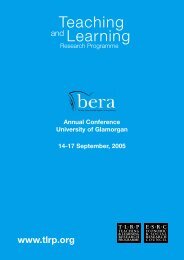Bera Booklet 2007 - Teaching and Learning Research Programme
Bera Booklet 2007 - Teaching and Learning Research Programme
Bera Booklet 2007 - Teaching and Learning Research Programme
Create successful ePaper yourself
Turn your PDF publications into a flip-book with our unique Google optimized e-Paper software.
Conference booklet 21/8/07 10:16 am Page 16Thursday6th September2.30 – 4.00pmSYMPOSIUM PRESENTATIONEducational <strong>Research</strong> <strong>and</strong> Policy: Epistemological Considerations (I)Chair: Professor David Bridges, Von Hügel Institute, Cambridge <strong>and</strong> University ofEast AngliaDiscussants: Professor Lesley Saunders, University of London, Institute ofEducation <strong>and</strong> General <strong>Teaching</strong> CouncilAbstract: This symposium will examine the extent to which educational policy canlegitimately be derived from educational research <strong>and</strong>, by extension, the extent to whichit should be so derived.This examination arises in a context in the USA <strong>and</strong> the UK in which there has beendisappointment by policy makers <strong>and</strong> researchers alike at the apparent lack of impact ofeducational research on educational policy. This disappointment has fed the growth ofpowerful movements in both countries which have promoted a very narrow conceptionof the kind of educational research which should be supported <strong>and</strong> of the methods <strong>and</strong>methodologies which can provide policy makers with answers to their questions about‘what works’.The symposium is drawn from an on-going programme of work funded under the ESRC<strong>Teaching</strong> <strong>and</strong> <strong>Learning</strong> <strong>Research</strong> <strong>Programme</strong> in which a group of philosophers of educationwere invited to consider the contribution which the philosophical literature might make toan underst<strong>and</strong>ing of the relationship between different kinds of research <strong>and</strong> policy. It seeksto give fresh consideration – based on philosophical work in the theory of knowledge –to the extent to which <strong>and</strong> the logical pathways by which different forms of enquiry canlegitimately inform educational policy (or not, as the case may be).There will be two linked symposia. This first symposium will begin by outlining theconcerns which led the way to the ‘what works’ phenomenon <strong>and</strong> examine critically thenature of the claims made under some of the different approaches to addressing the‘what works?’ challenge (Alis Oancea <strong>and</strong> Richard Pring). It will then go on to examinethe rhetorical <strong>and</strong> logical character of different kind of policy statements as a way ofunderst<strong>and</strong>ing both the scope for research to inform policy <strong>and</strong> what we shall argue tobe the inevitable limitations. This discussion will raise questions about the inescapablynormative character of ‘policy’ <strong>and</strong> the role of different research <strong>and</strong> scholarly traditions(including philosophy) in dealing with this normative ingredient (David Bridges <strong>and</strong> MichaelWatts). We shall then have two inputs illustrating the issues related to two contrasting formsof research: large population studies (Paul Smeyers <strong>and</strong> Bruno Vanobbergen) <strong>and</strong> casestudies (John Elliott <strong>and</strong> Dominik Lukes). To what extent could these kinds of educationalresearch inform education at a policy level?International EngagementAs part of the effort to maximize the impact of TLRP’sresearch findings, we are attempting to broaden the<strong>Programme</strong>’s international outreach. We particularlyinvite colleagues from the Middle East, Africa, Asia <strong>and</strong>South America to engage in a web-based knowledgeexchange with TLRP.In addition, to support the evolving internationalcollaboration between national education researchassociations, launched by AERA in Chicago, TLRP is trialinguse of a Virtual <strong>Research</strong> Environment (VRE) to enablecolleagues to share ideas <strong>and</strong> resources. A VRE is alsobeing provided to support international thematicexchange on ‘Critical Pedagogy’.For further details about these initiatives, pleasecontact Jehan Saleh, International Liaison <strong>Research</strong>er,j.saleh@ioe.ac.ukAre you aresearchervisitingfromoverseas?Paper 1The importance of being thorough: On systematic accumulations of‘what works’ in education researchAuthors: Alis Oancea <strong>and</strong> Richard Pring, University of Oxford, Departmentof EducationAbstract: Our paper will review documents emerging from (<strong>and</strong> connected with) the WhatWorks Clearinghouse (Institute of Education), U.S., <strong>and</strong> the EPPI-Centre, UK. The twoinitiatives have in common strong policy support, an ideal of cumulative knowledge inspiredby the medical model, <strong>and</strong> explicit references to the evidence-base movement epitomisedby the Cochrane <strong>and</strong> Campbell collaborations. However, whilst the US initiative emphasisesthe value of “scientific” education research, as measured against certain methodologicalst<strong>and</strong>ards <strong>and</strong> hierarchies of evidence, the UK initiative favours research synthesis, qualityassurance <strong>and</strong> evidence weighting (in a process originally called “systematic reviewing”).The paper will do three things. First, it will place the “what works” <strong>and</strong> “systematicreviewing” discourses in the wider contexts of the evidence-base movement (crossdisciplinary1 ); of the recent criticisms of educational research on grounds of relevance <strong>and</strong>impact; <strong>and</strong> of the UK research policy emphasis on economic competitiveness, relevance<strong>and</strong> accountability in the 1990s.Second, we plan to unpick these discourses <strong>and</strong> explore the underst<strong>and</strong>ing of knowledgethat they privilege, in terms of its nature, sources, scope, growth, <strong>and</strong> value. The set ofassumptions <strong>and</strong> hierarchies so revealed made the models a particularly powerful responseto recent policy-originated criticisms of education research (e.g., in terms of its alleged lackof relevance; fragmented, non-cumulative character; <strong>and</strong> lack of methodological rigour) 2 .However, while these models may be suitable for some education research, there is achorus of voices in the profession expressing concerns about their generalisation as the“golden” st<strong>and</strong>ard for policy-relevant <strong>and</strong> policy-recognized research 3 . The final part of ourpaper will therefore explore challenges to the models discussed, such as: the limitations ofthe analogy with medical <strong>and</strong> natural science research; the questionable hierarchies ofevidence <strong>and</strong> of sources, which underpin it; the restrictive model of knowledge with whichit operates (which does not fully take into account, for example, knowledge about theworld as “taken” by the person, rather than “given”; introspective, intuitive, <strong>and</strong> artisticpractice <strong>and</strong> knowledge; practical wisdom <strong>and</strong> the limits of technical knowledge); theinstrumentalisation of quality <strong>and</strong> of the assessment of evidence <strong>and</strong> of research; <strong>and</strong> theexclusion of modes of research that embrace non-cumulative, divergent, non-rational, ornon-teleological view of knowledge.We conclude that, while the systematic accumulation of validated evidence about “whatworks” may be an effective response to recent criticisms of education research, likely togain policy endorsement, <strong>and</strong> also an effective way of discarding certain instances of badresearch, at the same time it may be based on narrow assumptions about knowledge thatrun against what we see as some core principles of education research: critical attitude,diversity, <strong>and</strong> educational value.1See Thomas <strong>and</strong> Pring, 2004.2See Blunkett, 2000, <strong>and</strong> also: Hillage, J. et al (1998) Excellence in research on schools. DfEE <strong>Research</strong> Report74; Tooley, J. <strong>and</strong> Darby, D. (1998) Educational research: as critique, London, OFSTED.3See Schoenfeld, 2006.16 17
















